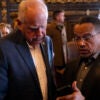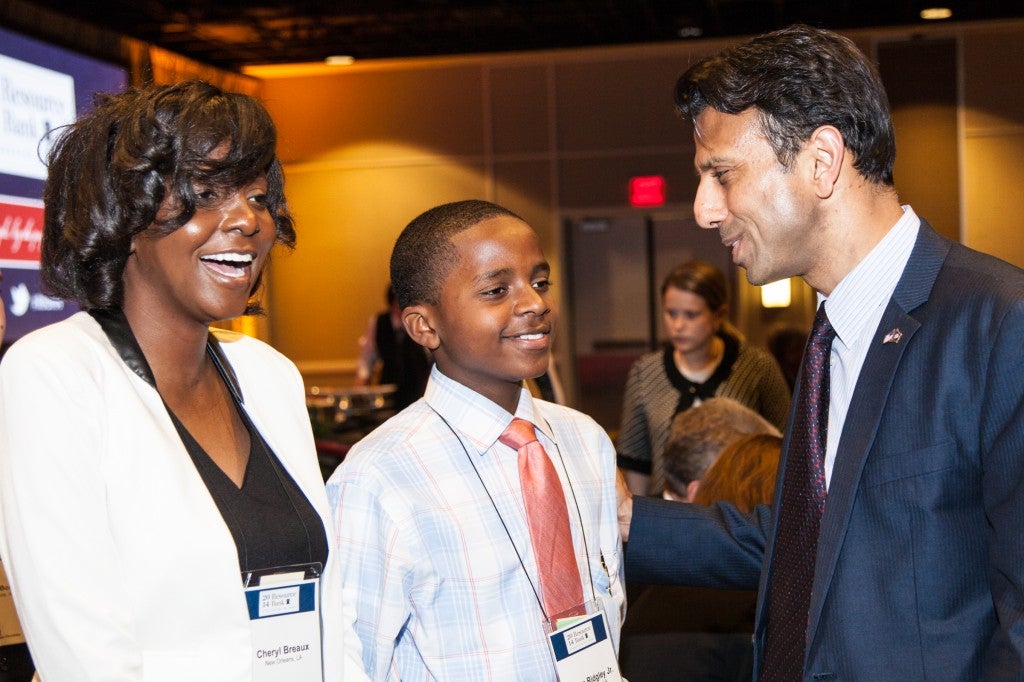This photograph shows Louisiana Governor Bobby Jindal with Brian Ridgley, Jr., one of the beneficiaries of the Louisiana school voucher program. Brian, a fifth grader at The Good Shepherd Nativity Mission School in New Orleans, is one of the students whom Attorney General Eric Holder tried to block when the Civil Rights Division of the Department of Justice filed a motion in August of last year asking a federal judge to stop Louisiana “from awarding any school vouchers…to students attending school in districts operating under federal desegregation orders.”
Holder was trying to use a 40-year-old court order to prevent Louisiana from giving students like Brian the chance to improve their education—which is what the original, outdated desegregation orders were intended to accomplish. These laws were put in place to stop official, government discrimination by school officials in Louisiana—not prevent school choice by parents trying to improve their children’s education.
Nine out of 10 students who use this voucher program are African-American like Brian. The scholarship program applies to any low-income family who would otherwise be assigned to a school that, under the state’s accountability system, is rated as “failing.” Families receiving a voucher can use it to attend any private or high-performing public school. According to a 2013 survey by the Black Alliance for Educational Options, about 1200 students receive vouchers, and 94 percent of parents are satisfied with the program.
The Justice Department’s motion provides a telling illustration of Eric Holder’s obsession with pursuing racial quotas—an obsession that can only be realized by sacrificing the quality of education. For example, DOJ complained about the loss of six black students from one elementary school because it would supposedly reinforce “the school’s racial identity as a white school in a predominantly black district.” But that school was only 30.1 percent black and the loss of six students out of a school population of over 700 would have almost no impact on the racial makeup of the school. Similarly, DOJ complained about five white students leaving another school that was 61.5 percent black, even though that would result in an almost imperceptible change in the school’s racial makeup.
The majority of students who receive these vouchers attend other public schools. The private schools that participate in the program must admit students by random selection, so this voucher program is not being used for any purpose other than for parents (who are overwhelmingly black) to get their students into higher-quality schools. But as Governor Jindal says, the Justice Department’s intrusion proves that “the people in Washington running our federal government are more interested in skin color than they are in education.”
One of the program’s great success stories, Brian Ridgley started attending The Good Shepherd School in the fall of 2008 when the Louisiana voucher program began as a pilot project. He has consistently surpassed his teachers’ expectations and they describe him as dedicated to his studies and respected by his peers. Brian has won just about every one of his school’s academic achievement awards, and, when The Heritage Foundation invited Brian to give the invocation at a dinner in New Orleans last week, he had an opportunity to meet Gov. Jindal.
At the dinner, it was clear that Brian wanted to meet the man who was the driving force behind the scholarship program—the opportunity that Brian needed to escape a failing school and have the chance to obtain the same quality education that parents like General Holder and President Obama can afford to give their kids.
Holder’s attempt to obtain an injunction against the Louisiana program generated such intense public backlash that the Justice Department dropped its request. However, DOJ is still demanding detailed information on every individual voucher applicant, as well as the racial composition of private schools participating in the program. Louisiana says that the voluminous information being requested by the Justice Department and the onerous approval process that Justice wants to put in place, which would allow it to object to any individual voucher award, would disrupt the program. It would also open the door to a flood of lawsuits: Louisiana would fight every disapproval because, as the state said in its response to the government’s motion, it “will never voluntarily accede to depriving an eligible child of an award that child receives through the lottery to attend an eligible participating school (and certainly not on account of that child’s race).”
Clint Bolick of the Goldwater Institute, which is representing families participating in the program, says that while the Justice Department may have backed off of its initial request for an injunction, it is continuing its legal assault through its latest demands in the case. Unfortunately, the federal judge in the case, Ivan Lemelle, refused to allow the families to intervene in the lawsuit. As Bolick laments, “the very people with the greatest stake in the outcome were denied the opportunity to even witness their fate being argued and decided.” According to Bolick, Judge Lemelle may be biased against the program, having complained at a hearing about a program taking money “away” from public schools.
What is very clear is that Brian Ridgley is thriving in the program that gave his mother, Cheryl Breaux, a chance to make sure her son got a good education in a safe school. With that opportunity, and a lot of hard work, there’s no telling how far Brian may go and what he may accomplish—if Eric Holder gets out of the way and quits blocking the schoolhouse door.































One Reply to “Meet One of the Students Eric Holder Is Blocking by Standing in the Schoolhouse Door”